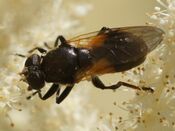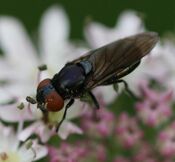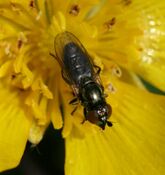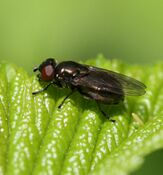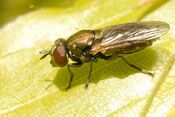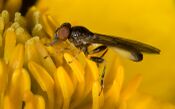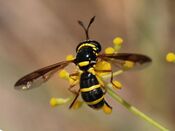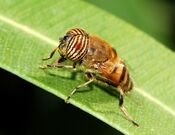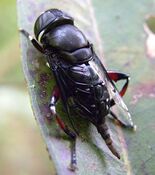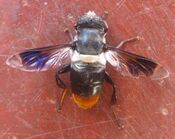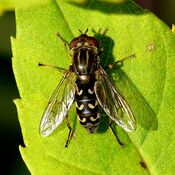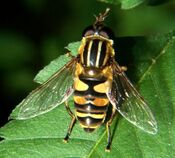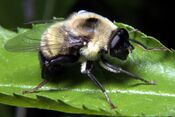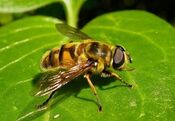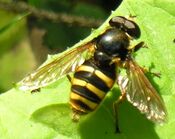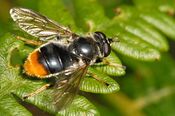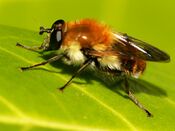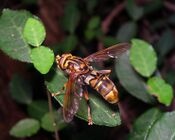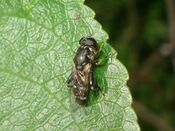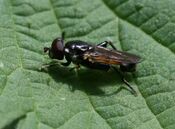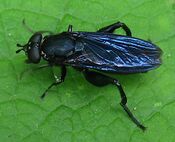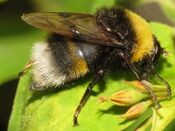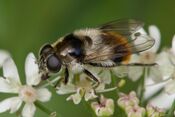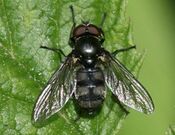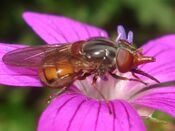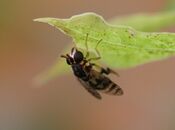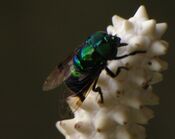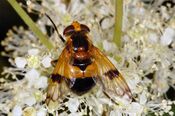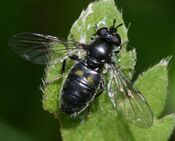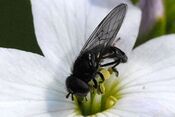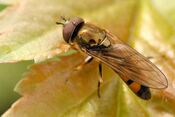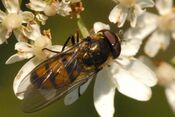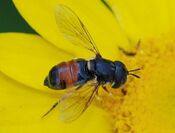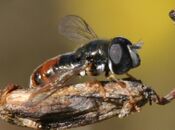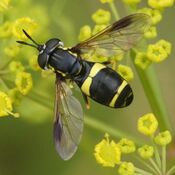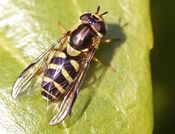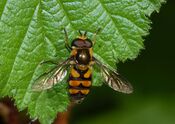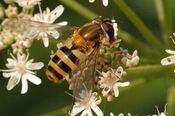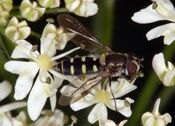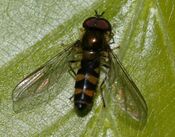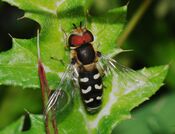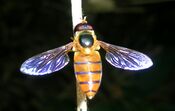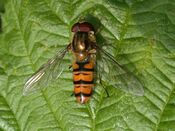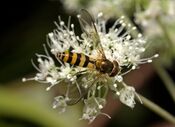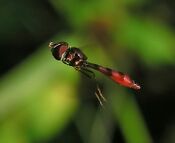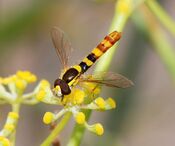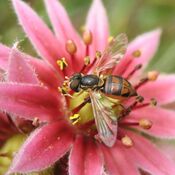Biology:List of Syrphidae genera
[1] The family Syrphidae consists of more than 6000 living species of hoverfly. The internal taxonomy of the family and the number of genera varies greatly between sources leading to considerable discrepancy across the literature. This is currently in the process of reorganization on the basis of phylogenetic studies but knowledge is still incomplete, especially in light of recent studies of larval characters suggesting relationships which don't correspond with the phylogeny based solely on adult characters.
The current classification is therefore still based on the morphology of adults and basically refers to the taxonomic scheme adopted by Thompson & Rotheray in the Manual of Palaearctic Diptera (1998), which divides the family into three subfamilies and fourteen tribes.
The nomenclature given here is derived partly from the BioSystematic Database of World Diptera (BDWD), and a working classification created by a group of molecular biologists which no doubt will alter greatly in the future.[2]
The distribution of genera in biogeographic realms is derived from the biosystematics BDWD.
Legend
- AF: Afrotropical realm
- AU: Australasian realm
- NE: Nearctic realm
- NT: Neotropical realm
- OR: Oriental realm
- PA: Palearctic realm
Eristalinae
The subfamily Eristalinae (=Milesiinae) is subdivided into 9 tribes.
Tribe: Brachyopini
(=Chrysogasterini Shannon, 1922)
Subtribe: Brachyopina
Subtribe: Spheginina
|
|
Tribe: Callicerini
(=Calliceratinae Brues & Melander, 1932)
- Callicera Panzer, 1809: NE NT OR PA
- Notiocheilosia Thompson, 1972: NT
Tribe: Cerioidini
|
(=Ceriini, Cerioidinae Wahlgren, 1909)
|
|
Tribe: Eristalini
Subtribe: Eristalina
|
|
Subtribe: Helophilina
|
|
Tribe: Sericomyiini
|
- sometimes regarded as a subtribe of the Eristalini
|
|
Tribe: Eumerini
(=Merodontini, Medorontinae Edwards, 1915, Medorontinae Bezzi, 1915, Medorontidae Glumac & Vujic, 1990, Nausigasterinae Shannon, 1921)
|
|
Tribe: Milesiini
(=Xylotini)
Subtribe: Blerina
|
|
Subtribe: Criorhinina
|
|
Subtribe: Milesiina
|
|
Subtribe: Temnostomina
|
|
Subtribe: Tropidiina
|
|
Subtribe: Xylotina
|
|
Tribe: Rhingiini
(=Cheilosiini Cockerell, 1917)
Subtribe: Cheilosiina
Subtribe: Pelecocerina
Subtribe: Psarina
Subtribe: Rhingiina
|
|
Tribe: Volucellini
|
|
Microdontinae
The arrangement of genera here follows the extensive revision carried out by Reemer & Ståhls (2013).[5]
Tribe: Microdontini
Tribe: Spheginobacchini
|
|
Pipizinae
The subfamily Pipizinae was formerly considered a tribe within Eristalinae, but a recent phylogenetic analysis suggests it should be ranked as a separate subfamily (Mengual, 2015)[15].
- Cryptopipiza Mutin, 1998
- Heringia (=Cnemodon): NE PA
- Subgenera:
- H. (Heringia) Rondani, 1856
- H. (Neocnemodon) Goffe, 1944
- Subgenera:
- †Oligopipiza Nidergas, Hadrava, Nel et al., 2018 (a fossil genus from Middle Oligocene ~28 MYR-BP): PA
- Pipiza Fallén, 1810 (=Pseudopipiza): NE NT PA
- Pipizella Rondani, 1856: PA
- Trichopsomyia Williston, 1888 (=Halictomyia): NE NT OR PA
- Triglyphus Loew, 1840: AU OR PA
Syrphinae
The subfamily Syrphinae is subdivided into 4 well established tribes. For table of genera, subgenera, authors and types see Mengual et al (2008)</ref>
Tribe: Bacchini
(=Melanostomatini)
|
|
Tribe: Paragini
|
|
Tribe: Syrphini
(=Chrysotoxini). In Mengual et al. (2008) this tribe was resolved into two groups.
Syrphini (Group 1)
|
|
Syrphini (Group 2)
|
|
Syrphini (Group undetermined)
- Agnisyrphus Ghorpade, 1994: OR
- Asiodidea Stackelberg, 1930: PA
- Dideomima Vockeroth, 1969: NE NT
- Doros Meigen, 1803: NE PA
- Lamellidorsum Huo & Zheng, 2005: PA
- Pelloloma Vockeroth, 1973: AF
- Rhinobaccha Meijere, 1908: OR
- Vockerothiella Ghorpade, 1994 : OR
Tribe: Toxomerini
Genera of uncertain affinities
This section contains a list of genera for which the bibliography does not provide a clear systematic position. These genera are not intended as incertae sedis: It is likely that they have been given a formal taxonomic description or been defined in a subsequent revision, but not in the works consulted.
- Pia Philippi, 1865: NT
- Poliomyia Scudder, 1878: NE
- Spheginascia Meunier, 1901: PA
See also
- Hoverfly genera
- Lists of insect genera
- Syrphidae of New York State
- List of flower fly species of North America
Notes
- ↑ Not to be confused with the very similar name Kerteszomyia (Diptera: Lauxaniidae)
- ↑ With regard to the subgenus H. (Pilinasica) consisting of four species endemic to New Zealand, Thompson (2000, 2008) and Katzourakis et al. use the name Pilinascia instead. It is likely this has been the result of a spread of a misspelling as in the literature there have been no formal reviews of the name Pilinasica Malloch, 1922 with the exception of the proposal of a subgenus of Helophilus.
- ↑ The genus was defined by Reemer (2008) to include two newly described species from Suriname, Surimyia minutula (= Paragodon minutulus) and Surimyia rolanderi. The review is quoted by Cheng & Thompson (2008) but not reported in BDWD where the species S. minutula is placed in the genus Paragodon.
References
- ↑ :it:Generi di Syrphidae
- ↑ Lifedesks: Classification of Syrphidae http://syrphidae.lifedesks.org/node/1476
- ↑ Johnson, Charles W. (1898). "Diptera collected by Dr. A. Donaldson Smith in Somaliland, eastern Africa". Proceedings of the Academy of Natural Sciences of Philadelphia 50: 157–164. https://www.biodiversitylibrary.org/page/26368835#page/157/mode/1up. Retrieved 21 October 2016.
- ↑ Doczkal, Dieter; Radenković, Snežana; Lyneborg, Leif; Pape, Thomas (2016). "Taxonomic revision of the Afrotropical genus Megatrigon Johnson, 1898 (Diptera: Syrphidae)". European Journal of Taxonomy (238): 1–36. ISSN 2118-9773. http://www.europeanjournaloftaxonomy.eu/index.php/ejt/article/download/362/743. Retrieved 21 October 2016.
- ↑ Reemer, Menno; Ståhls, Gunilla (2013). "Generic revision and species classification of the Microdontinae (Diptera, Syrphidae)". ZooKeys (288): 1–213. doi:10.3897/zookeys.288.4095. PMID 23798897. PMC 3690914. https://www.pensoft.net/book/12776/. Retrieved 2014-08-18.
- ↑ 6.0 6.1 6.2 6.3 6.4 6.5 6.6 6.7 Treated as a subgenus of Microdon by BDWD and a genus in Cheng & Thomson (2008).
- ↑ 7.00 7.01 7.02 7.03 7.04 7.05 7.06 7.07 7.08 7.09 7.10 Cheng, Xin-Yue; Thompson, F. Christian (2008). "A generic conspectus of the Microdontinae (Diptera: Syrphidae) with the description of two new genera from Africa and China" (PDF Adobe Acrobat). Zootaxa 1879: 21–48. doi:10.11646/zootaxa.1879.1.3. ISSN 1175-5334. http://mapress.com/zootaxa/2008/f/zt01879p048.pdf. Retrieved 2009-09-11.
- ↑ Treated as a synonym of Microdon by BDWD but as a genus in Cheng & Thompson (2008).
- ↑ 9.0 9.1 9.2 9.3 Hull, Frank. M (1937). "New Species of Exotic Syrphid Flies" (PDF Adobe Acrobat). Psyche 44 (1–2): 12–32. doi:10.1155/1937/46960. http://downloads.hindawi.com/journals/psyche/1937/046960.pdf. Retrieved 2018-05-25.
- ↑ Proposed as a synonym for Microdon by Cheng & Thompson (2008) and reported as such by BDWD.
- ↑ 11.0 11.1 Hull, Frank. M (1937). "A megamorphic and two curious mimetic flies" (PDF Adobe Acrobat). Psyche 44 (4): 116–121. doi:10.1155/1937/67124. http://downloads.hindawi.com/journals/psyche/1937/067124.pdf. Retrieved 2018-05-25.
- ↑ Not reported by BDWD.
- ↑ Defined as a subgenus in BDWD though without evidence in the nomenclature; in Cheng & Thompson (2008) is indicated as a subgroup of Microdon.
- ↑ Reemer, Menno (2008). "Surimyia a new genus of Microdontinae, with notes on Paragodon Thompson, 1969 (Diptera, Syrphidae)" (PDF). Zoologische Mededelingen 82: 177–188. http://www.repository.naturalis.nl/record/261778.
- ↑ Mengual, Ximo; Ståhls, Gunilla; Rojo, Santos (2015-01-12). "Phylogenetic relationships and taxonomic ranking of pipizine flower flies (Diptera: Syrphidae) with implications for the evolution of aphidophagy". Cladistics (Wiley) 31 (5): 491–508. doi:10.1111/cla.12105. ISSN 0748-3007. PMID 34753266.
- ↑ Huo, Ke-Ke; Shi, Fu-Min (2010). "Flavizona (Huo), a new genus of Syrphini from China, with a key to genera of Syrphini in China". Zootaxa 2428: 47–54. doi:10.11646/zootaxa.2428.1.4.
- ↑ Mengual, X; Ghorpadé, K (2010). "The flower fly genus Eosphaerophoria Frey (Diptera, Syrphidae)". ZooKeys (33): 39–80. doi:10.3897/zookeys.33.298.
Bibliography
- BioSystematic Database of World Diptera [1]
- Libor Mazánek. Syrphidae Latreille, 1802. In L. Jedlička, V. Stloukalová, M. Kúdela (editor), Checklist of Diptera of the Czech Republic and Slovakia. Electronic version 1 + CD-ROM, 2006. ISBN:80-969629-0-6.
- Katzourakis, A.; A. Purvis; S. Azmeh; G. Rotheray; F. Gilbert (2001). "Macroevolution of hoverflies (Diptera: Syrphidae): the effect of using higher-level taxa in studies of biodiversity, and correlates of species richness". Journal of Evolutionary Biology 14 (2): 219–227. doi:10.1046/j.1420-9101.2001.00278.x.
- Mengual, X.; Gunilla Ståhls; Santos Rojo (2008). "First phylogeny of predatory flower flies (Diptera, Syrphidae, Syrphinae) using mitochondrial COI and nuclear 28S rRNA genes: conflict and congruence with the current tribal classification". Cladistics 24 (4): 543–562. doi:10.1111/j.1096-0031.2008.00200.x. PMID 34879632. http://entomology.si.edu/StaffPages/Mengual_Ximo/2008_Cladistics.pdf. Retrieved 2009-10-19.
- Mengual, X.; Carlos Ruiz; Santos Rojo; Gunilla Ståls; Frederic Christian Thompson (2009). "A conspectus of the flower fly genus Allograpta (Diptera: Syrphidae) with description of a new subgenus and species". Zootaxa 2214: 1–28. doi:10.11646/zootaxa.2214.1.1. ISSN 1175-5326. http://www.mapress.com./zootaxa/2009/f/zt02214p028.pdf. Retrieved 2009-10-19.
- Sabrosky, C. W. Family-Group Names in Diptera. An annotated catalog. In F. Christian Thompson (editor), MYIA The International Journal of the North America Dipertists' Society. Volume 10. Leiden, Backhuys Publishers, 1999.
- Thompson, F. C., & Rotheray, G. Family Syrphidae. In: László Papp, Béla Darvas (editor) Manual of Palaearctic Diptera. Volume 3: Higher Brachycera. Budapest, Science Herald, 1998: 81-139 . ISBN:963-04-8838-8
- Shannon, R. C. (1926). "Review of the American xylotine syrphid-flies". Proceedings of the United States National Museum 69 (9): 1–52. doi:10.5479/si.00963801.2635.
- Stubbs, Alan E.; Falk, Steven J (1983). British Hoverflies: An Illustrated Identification Guide (2nd ed.). London: British Entomological and Natural History Society. pp. 253, xvpp. ISBN 978-1-899935-03-1.
- Thompson, F. C.; Vockeroth, J. R.; Sedman, Y. S. (1976). A Catalogue of the Americas South of the United States: Family Syrphidae. São Paulo, Brasil: Museu de Zoologia. https://archive.org/stream/familysyrphidae00thom#page/n1/mode/2up. Retrieved 2 February 2011.
- Thompson, F. C. (1972). "A contribution to a generic revision of the Neotropical Milesiinae (Diptera: Syrphidae)". Arquivos de Zoologia 23: 73–215. http://www.revistasusp.sibi.usp.br/pdf/azmz/v23n2/a01v23n2.pdf.
- Thompson, F. C. (1975). "Notes on the status and relationships of some genera in the tribe Milesiini (Diptera: Syrphidae)". Proceedings of the Entomological Society of Washington 77 (3): 291–305. http://entomology.si.edu/StaffPages/ThompsonFC/1975_Milesiini.pdf.
- Thompson, F. C. (2000). "A new genus of Australasian Flower Flies (Diptera: Syrphidae". Studia Dipterologica 7 (Heft 2): 373–384. ISSN 0945-3954. http://entomology.si.edu/StaffPages/ThompsonFC/2000_AustralasianFlies.pdf. Retrieved 2009-10-20.
- Thompson, F. C. (2003). "Austalis, a new genus of flower flies (Diptera: Syrphidae) with revisionary notes on related genera". Zootaxa 246: 1–19. doi:10.11646/zootaxa.246.1.1. ISSN 1175-5326. http://www.sel.barc.usda.gov/Diptera/people/FCT_pdf/austalis.pdf. Retrieved 2009-10-18.
- Thompson, F. C. (2008). "A conspectus of New Zealand flower flies (Diptera: Syrphidae) with the description of a new genus and species". Zootaxa 1716: 1–20. doi:10.11646/zootaxa.1716.1.1. ISSN 1175-5326. http://ddr.nal.usda.gov/dspace/bitstream/10113/13621/1/IND44044509.pdf. Retrieved 2009-10-19.
- Thompson, F. C.; Vockeroth, John Richard (17 April 2016). "51. Family SYRPHIDAE". in Neal L. Evenhuis. Catalog of the Diptera of the Australasian and Oceanian Regions (online version ed.). Bishop Museum. http://hbs.bishopmuseum.org/aocat/syrphidae.html. Retrieved 2018-11-14.
- Van Veen, M.P. (2004). Hoverflies of Northwest Europe, Identification Keys to the Syrphidae (Hardback). Utrecht: KNNV Publishing. pp. 254. ISBN 978-90-5011-199-7.
- Vockeroth, J. R. & Thompson, F. C. Syrphidae. In: Jeffrey F. McAlpine (editor) Manual of Nearctic Diptera, Volume 2. Research Branch, Agriculture Canada, Monograph 28, 1987: 713-743. ISBN:0-660-12125-5.
- Xin-Yue Cheng; Frederic Christian Thompson (2008). "A generic conspectus of the Microdontinae (Diptera: Syrphidae) with the description of two new genera from Africa and China". Zootaxa 1879: 21–48. doi:10.11646/zootaxa.1879.1.3. ISSN 1175-5326. http://mapress.com/zootaxa/2008/f/zt01879p048.pdf. Retrieved 2009-10-18.
 |

